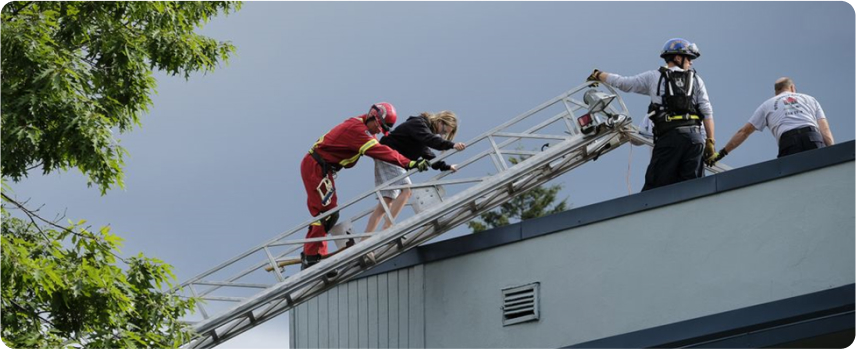How we work with the Ministry of Emergency Management and Climate Readiness
 Each organization plays a unique role in wildfire safety and broader emergency management.
Each organization plays a unique role in wildfire safety and broader emergency management.
On this page
Division of responsibilities
The Ministry of Emergency Management and Climate Readiness (EMCR) and the BC Wildfire Service (BCWS) have different yet complementary roles in managing wildfires and other incidents.
EMCR and BCWS operate based on their specialized expertise and functions.
BCWS manages wildfires because we have specialized knowledge, skills and resources dedicated to understanding, preventing and combating wildfires. While our primary focus is on fighting wildfires, BCWS may also be asked to provide necessary support during other emergency scenarios.
EMCR has a broader mandate that encompasses overall emergency management strategies for a range of emergencies, such as wildfires, floods and landslides. They're responsible for providing support to impacted communities throughout all phases of emergency management. EMCR's responsibilities support the efforts of Emergency Operations Centres (EOC).
Before a wildfire
Early-stage prevention and readiness help to proactively manage wildfire challenges.
| Activity | Lead agency |
|---|---|
|
Conducts controlled burns and other fuel management methods to manage fuel loads and reduce wildfire risk on Crown land. |
|
| Engages and aligns other partners on readiness before the wildfire season. For example, through meetings and communication plans. |
|
| Implements fire bans and restrictions to reduce wildfire risks. |
|
| Maintains and updates information on PreparedBC. |
|
| Procures contracted equipment from various equipment owners for BC Wildfire Service use. For example, high pressure water pumps, rock trucks and skidders. |
|
|
Provides emergency management training to communities (staff and elected officials) and other agencies. |
|
| Provides funding for wildfire prevention initiatives. |
|
| Provides public education to enhance community resilience and readiness, such as school programs and community workshop. |
|
| Signs off on burn plans. |
|
| Supports local governments with wildfire-related funding applications. |
|
During a wildfire
When a wildfire is happening, quick and organized action is important.
| Activity | Lead agency |
|---|---|
| Continues to monitor affected areas for potential flare-ups or secondary fires to ensure that all fire threats are fully extinguished. |
|
| Coordinates food and grocery supply continuity. |
|
| Facilitates calls with BCWS representatives, EMCR and impacted communities to coordinate and discuss high-level recommendations on evacuation alerts and orders. |
|
| Facilitates critical infrastructure calls between EMCR, BCWS and partners with affected critical infrastructure sites, such as BC Hydro. |
|
| Facilitates the arrangements of psychosocial support, such as counsellors and support groups, through health partners. |
|
| Maintains EmergencyInfoBC. |
|
| Maintains the wildfire information dashboard. |
|
Manages wildfire efforts on Crown land.
|
|
| Supports EMCR with broader emergency management efforts. For example, providing equipment and deploying personnel to support flood response. |
|
| Works with communities to help affected people find emergency shelter. |
|
After a wildfire
Once a fire is out, rehabilitation and recovery begin.
| Activity | Lead agency |
|---|---|
| Conducts post-fire investigations to determine the cause of the fire and evaluates the response to inform future prevention and suppression strategies. |
|
| Coordinates food and grocery supply continuity. |
|
| Coordinates recovery and rebuilding efforts with all partners, such as local governments and First Nations. |
|
| Engages in restoring damaged land to help nature recover and lower the chances of future wildfires. |
|
| Facilitates the arrangements of psychosocial support, such as counsellors and support groups, through health partners. |
|
| Sets up a recovery branch for the affected community. |
|
| Works with communities to help impacted people find temporary accommodation. |
|
